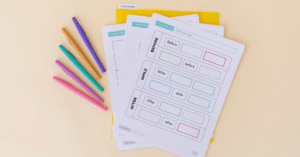This is a guest blog post by Monica, a school-based SLP, all about how to incorporate trauma-informed practices while building relationships with students.
This post by The Informed SLP talks about the effects of trauma on language development, and if you haven’t read it, you should! They, of course, go over a lot of research, including a 40-year meta-analysis by Sylvestre et al. (2015) that highlights that abuse and neglect lead to delayed language skills. Their post also provides many resources and a reminder that you are almost always a mandated reporter.
I will be honest and say that I take a trauma-informed approach with all of my students. I don’t want to assume that they have not experienced trauma because there may not be outward signs of it. Sometimes we find out later that our students are in foster care or have a difficult family situation. I would rather take a universal approach and have students feel safe rather than find out later that one of my students needed extra support. Here are some supports that I have found to be helpful:
1. Don’t use hand over hand.
If students need extra support, they can put their hand on top of yours, but ask for consent first.
2. Tell students the plan for your lesson.
I tell my students what the plan is each time we have a session. If we are going to have a change in our regular routine, I’ll also let them know in advance.
I also do my best to tell students what goal they are working on that day, and we occasionally review why it’s important to work on that goal. Knowing what they’re working on also gets a lot of buy-in from students at any age.
For younger students, I ask them if (their goal area) is really hard to do. They typically say yes, and I tell them that I will be working with them to make it easier. I talk about related activities and how they’ll be easier after we work on them. I also talk about how there will be times when they feel frustrated working on their goals and talk about how they can self-advocate for themselves.
The more reluctant students are typically older. With these students, we work together to choose goals, and we also talk about what it would take to be in speech for less time or to possibly exit.
Overall, these strategies help students feel like their voices are being heard.
3. Be predictable.
My students are the most comfortable when my expectations are very clear, and the consequences are very predictable. Allow time for transitions and give ample warning time for when an activity is going to end.
4. Don’t base your rules on compliance.
I only have a couple of true “rules” in speech. We need to stay safe, and we need to be kind to each other. If I ask a student to change their behavior, I will relate to safety or kindness. For example, if a student is leaning back on their chair, I will say, “We need to be safe. You can either sit all the way in your chair or stand if you need to move around. I don’t want you to get hurt.” That way, I have recognized that they aren’t intentionally breaking “rules”. They may just need movement to keep regulated, and they are having a hard time sitting in their chair.
5. Recognize emotions and feel emotions.
Don’t be quick to have students quickly recover from strong emotions to continue the session. You can work with the school counselor to see what would be appropriate to work on. Autistic students may also have alexithymia and have difficulty recognizing and labeling their emotions (Poquérusse et al., 2018).
6. Be flexible.
Sometimes you won’t get the activity that you planned done if a student is having a rough day. Communicating how they are feeling and working on a less structured activity still works on a student’s access to the school environment/curriculum and their ability to succeed at school. It only takes one adult at school that has the time to listen to them to make a difference.
If your student has a behavior that breaks a “rule” that you have, but you weren’t clear about your expectation for that rule and the consequences, then you have to be flexible about what happens. Admit that adults make mistakes too and that now that we know what the expectation is, we are going to enforce what the consequences are.
Rachel “The PTSD SLP” also shares some great content on Instagram.
View this post on Instagram
References
Poquérusse, J., Pastore, L., Dellantonio, S., & Esposito, G. (2018). Alexithymia and Autism Spectrum Disorder: A Complex Relationship. Frontiers in Psychology, 9, 1196.
Sylvestre, A., Bussières, È.-L., & Bouchard, C. (2016). Language Problems Among Abused and Neglected Children: A Meta-Analytic Review. Child Maltreatment, 21(1), 47–58.




Reader Interactions